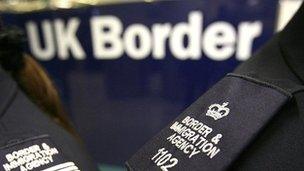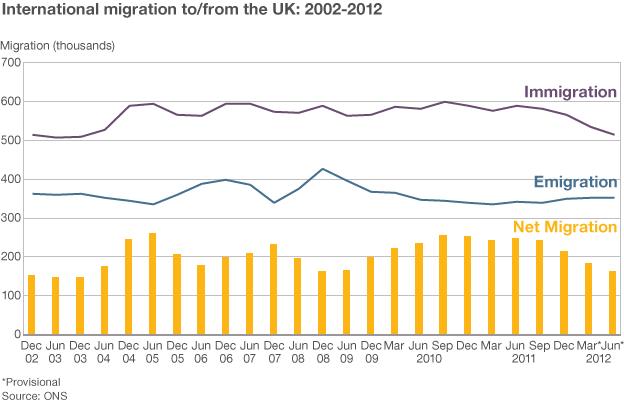UK net migration falls by a third
- Published

The government wants to cut net migration to below 100,000 by 2015
Net migration to the UK fell by a third in the year ending June 2012, compared with the previous 12 months, the latest immigration figures show.
The Office for National Statistics said 163,000 more people came to live in the UK, external for 12 months or more than had left, compared with 247,000 the year before.
The ONS said this was driven by a drop in immigration, and study remained the most common reason to come to the UK.
Ministers want to cut net migration to the "tens of thousands" by 2015.
'Tough reforms'
The ONS said the figure of 515,000 people who had immigrated to the UK in the year ending June 2012 was "significantly lower" than the 589,000 who had come in the previous year.
Its figures also showed:
A fall in the number of migrants from New Commonwealth countries - 117,000 compared with 168,000 the previous year - and those from EU accession countries, including Poland - 62,000 compared with 86,000 the previous year
Some 352,000 emigrants left the UK in the year ending June 2012, "similar" to the estimate of 342,000 in the year to June 2011
Excluding visitor and transit visas, the number of visas issued fell 10% to 507,701 in the year ending December 2012, the lowest 12-monthly total recorded using comparable data available from 2005
In the year to December 2012, there were 209,804 visas issued for the purpose of study (excluding student visitors), a fall of 20% compared with the previous 12 months
Sponsored visa applications fell 22%, with a 3% increase for the university sector and falls of 62% for further education, 69% for English language schools and 14% for independent schools
Immigration minister Mark Harper said: "Our tough reforms are having an impact in all the right places - we have tightened the routes where abuse was rife and overall numbers are down as a result.
"We will continue to work hard to bring net migration down from the hundreds of thousands to the tens of thousands by the end of this Parliament and to create a selective immigration system that works in our national interest."
But Chris Bryant, shadow immigration minister, said: "Net migration is falling but public concern is rising.
"These figures demonstrate that the government is not focusing on the kind of immigration that worries people the most. Half the drop is down to students, while 30% of the net migration reduction is down to fewer British people.
"Worryingly, the government appear to be taking some students away from full visas with proper checks and giving them student visitor visas instead, yet we know these visas have fewer checks and are more open to abuse. This is an own goal."

UKIP immigration spokesman Gerard Batten said "These figures hardly reduce immigration to the 'tens of thousands' promised by the government. They reflect the tightening up of the student visa system which was, and still is, open to flagrant abuse.
"These reductions in the net figure represent a temporary dip since the government has no long-term plan to control EU migration."
Dr Scott Blinder, of Oxford University's Migration Observatory, predicted that the government could find it "even more challenging" from now on to reach its target.
"Of the decline of 92,000 in net migration from its recent peak, a bit more than half come from changes in non-EU migration, where the government's policy changes may be having an impact.
"Making the further cuts in non-EU net migration needed to reach the target... could still be a difficult task, as these figures are greater than the total remaining reductions projected in the government's impact assessments for its policy changes."
'Bogus students'
Pressure group Migration Watch UK welcomed the overall drop in net migration. Its chairman Andrew Green said it was "evidence that the government's policies are starting to take effect".
"The universities have been wrong to claim that their sector was suffering from the restrictions designed to tackle bogus college students," he added.
But the Institute for Public Policy Research think tank said much of the fall in immigration had been the result of a fall in the number of people coming to study in the UK - which was down from 239,000 to 197,000 - which would only have a short-term effect on the net migration figures.
Sarah Mulley of the IPPR think tank said: "Because most students stay in the UK only for a short time, reduced immigration now will mean reduced emigration in the future, which by 2015 could partially reverse the falls we are seeing today."
The previous set of figures - to the end of March 2012 - showed net migration was 183,000.
- Published15 October 2012
- Published14 April 2011
- Published29 November 2012